 |
| Puerto Rican Tody |
 |
| Puerto Rican Ground Lizard (Siguana) |
 |
| Puerto Rican Tree Snail |
The walk from the car to the trailhead wasn't long but it was rich with sights, especially of the botanical kind.
 |
| Mexican Primrose Willow, Ludwigia octovalvis |
It isn't surprising that I found so much to see and photograph there - pretty much every plant, every wildflower I saw there was new to me, and beautiful.
 |
| White Beggarticks, Bidens alba |
Even little, seemingly unassuming wildflowers grabbed my attention. I tried documenting everything I saw that day.
 |
| Rattail, Stachytarpheta cayennensis |
Around the curve of the road we had a view to the north. It was a very cloudy day already but below the cloud the view of the coastline, way far below, was absolutely gorgeous.
 |
| Northeast coastline of Puerto Rico, Fajardo area |
My daughter called e away from my reverie. She had found a slug. I looked at where she was pointing but all I could see was a dry leaf resting on top of a green leaf. Where was the slug? Then she turned the leaf a bit until I saw it - that dry leaf was the slug! What a camouflage!
 |
| Slug |
There were people hanging by the trailhead and I waited a couple of minutes to take a people-free photo of the beginning of our hike.
 |
| Mount Britton Trailhead |
My initial idea was to hike up to Torre Britton - a historic tower on Mount Britton. The trail to the tower however, was one of the trails that were closed so we settled for hiking up to the road leading there, then deciding where to go next.
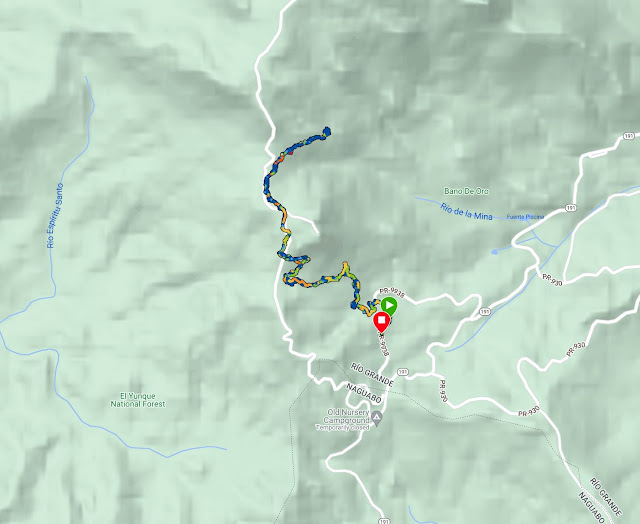 |
| Our hike as captured by my GPS |
I can probably count on one hand the times I've been in a tropical rain forest. We were certainly hiking in one now. The vegetation was thick, all forest levels were there from ground to canopy, and the air was hot and muggy. I was grateful that no mosquitos bothered us. Not then, anyway.
 |
| Mount Britton Trail |
The trail followed the path of a creek, which we heard all along but didn't get to see much of, due to the thick vegetation. We did cross some side tributaries every now and then. A park employee whom we talked with at Baño Grande told us that when it pours, these little creeks can become fast flowing flash floods and the trails can become really dangerous.
The trail was on a constant slope. Milder in parts, and with build stairs in the steeper parts. Naturally, there were numerous switchbacks on the steeper parts, one of which was fairly early on. At the top of the first steep stretch the trail curved and leveled a bit and the vegetation parted to reveal a lovely forest pond with a fine sand beach next to it. The pond was tiny and of course there was no going down to it, but people took turns crouching on a flat rock that extended from the trail and was the best spot to take photos from.
 |
| Pond |
Near the pond bloomed lovely white-pinkish flowers. I admired their delicate beauty vocally while taking photos, and a passer-by hiker told me these were begonia flowers. I was surprised - they didn't look much like the cultivated begonias I was used to seeing potted in gardening stores. On closer inspectin though, I could see they truly were begonia plants. Wild begonia is very lovely. I thought they looked way better than their cultivated relatives.
 |
| Corazón de Poeta, Begonia decandra |
A light drizzle started, but before we were convinced to pull out our rain ponchos the drizzle ceased. We came near a small roofed structure, probably put there for people to find shelter during more serious rains. Near the structure stood a group of hikers on an organized tour. The group's guide was talking to them and when I caught on the topic I drew my daughter near - she was talking about the local birds. She talked about the tody - a little bird that would be really nice to see. The tody, the guide said, nests in holes along the trail, and that they might see the holes but unlikely to see the birds themselves because they were in a group.
The guide noticed us close to her group and said that we are welcome to join them. When they started to move again however, I motioned my daughter to fall back. My daughter really wanted to see the tody, it was on her wanna see list, and I convinced her that being on our own and not with a large group would give us better chances to do so.
 |
| Mount Britton Trail |
Besides, I was happy going slow, checking out every wildflower on the way and not having t keep up with the pace of the group.
There were many lizards all over the place. Most of them I didn't see at all until my daughter pointed them out to me. She could spot them much better than I did. Sometimes though, I got lucky too.
The trail was all cement throughout. Wherever it was elevated from the actual forest floor I had a vivid reminder why - the rain forest experiences much rain of course, and wherever the soil isn't held fast by the vegetation, it gets eroded away. Often it erodes away from tree roots as well, exposing them to air and weakening the tree's hold in the ground.
 |
| Exposed roots of the Puerto Rican Royal Palm |
The exposed slope near the trail was apparently, the favorite place of the tody birds to dig their nesting holes. I started seeing these holes and eventually I spotted one that looked within current use. I puled my daughter over to the other side of the trail at a good distance, where we could look at the nest's area without being an obstruction or a bother to its users. We both fell silent and waited.
 |
| A tody's nesting hole |
It took maybe a minute, maybe a couple of minutes, and the coveted bird appeared and perched on a twig not far from the nest, within full view of our cameras. My daughter with her tele lens got the best shots and one of her photos heads this blogpost. Even I got some decent shots with my camera. The group guide from whom I learned about where to look for the tody had also said that this bird was endemic to Puerto Rico and was a
candidate for being Puerto Rico's national bird. It didn't get the
title though, the reason being the name it got - Tody mexicanus. This
bird isn't mexican at all, but the person naming it was inspired by the
bird's colors that match those of the Mexican flag.
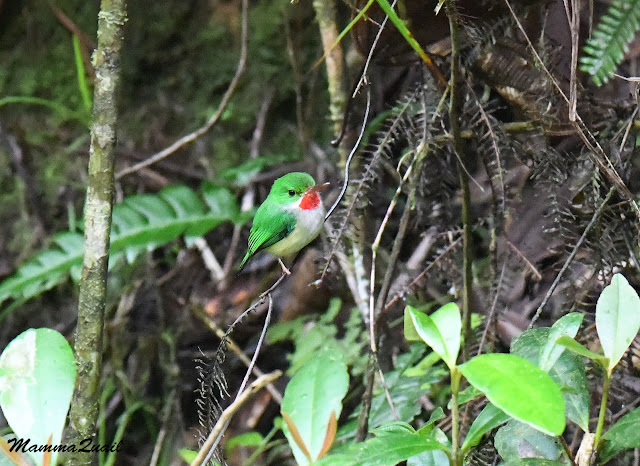 |
| Puerto Rican Tody |
After half a minute of clicking cameras I pulled my daughter and motioned her to go on up the trail. We didn't want to bother the tody. She might have eggs or chicks inside that hole. My daughter followed me reluctantly, wearing an ear to ear smile. Throughout the entire trip whenever I wanted to score some points I'd remind her that I was the one who found her the tody.
 |
| Puerto Rican Royal Palms |
The trail became steeper again and once more we were going up switchbacks and occasional sets of stairs. My daughter wanted to stop for a break and a snack and I suggested that it would be best stopping when we got to the road. She agreed and followed me uphill.
 |
| Puerto Rican Water Willow, Justica martin |
When we reached the road we found nowhere suitable for sitting down other than the asphalt itself. There were plenty of people there already so I suggested to my daughter to push on a bit further up the road to the trailhead of Torre Britton. That trail I already knew was closed but I hoped to have at least a better view and a quieter place to sit for a break.
 |
| Mount Britton Road |
The road up to the Britton Tower trailhead was also lined up with many wildflowers, some of which we've seen along the entire trail.
 |
| Fringepink, Arthrostemma ciliatum |
One of the most common flowering plants along the hike was the Tibey Tupa lobelia bush. The flowers, clamped in a nice, sturdy inflorescence, were long and tubular.
 |
| Tibey Tupa, Lobelia portoricensis |
We arrived at the trail junction with the Torre Britton (the Britton Tower) trail, and found it closed indeed. Two workers in a pickup truck blocked the trail entrance. They nodded to us and said they are waiting for someone else to come with keys to a porta-potty they had behind the fence. Next to the Torre Britton Trail was another trailhead - the Mount Britton Spur Trail. There was a nice piece of grass there by the trailhead and we sat there to rest and snack. There might have been a lovely view from that place but all we could see was a cloud sitting low on the palm-covered mountain. The cloud cover can mislead someone from a temperate climate country - it was a hot even within that cloud.
 |
| Low clouds |
While we were eating a yellow bird with a curved beak showed up and landed on the Tibey Tupa bush nearby. We've seen this bird already yesterday in San Juan - it was a bananaquit. Within seconds the bananaquit started displaying the use of its curved beak as it fitted it perfectly into the tubular flowers of the tibey tuba, sucking the nectar while pollinating the flowers.
 |
| Bananaquit |
I convinced my daughter to continue the hike on the Britton Spur Trail. This part didn't have to much elevation changes and it wasn't long to the next trail junction that split between the mountain summit and the El Yunque Trail.
 |
| Mount Britton Spur Trail |
We were rewarded with new sights almost immediately when a couple of steps into the trail I spotted a sensitive plant in bloom. Now, nearly all the plants I've seen in Puerto Rico were completely strange to me, except those who were introduced to the island from places I knew or those exported from the island as landscaping material. The sensitive plant however, I knew from my botany class in college - my botany professor had a greenhouse on campus with an interesting collection of plants and the sensitive plant was among them. He loved showing us how the leaflets retract upon touch. I showed it to my daughter too. She knew about this plant from nature videos and she was excited to see it in nature.
 |
| Sensitive Plant, Mimosa pudica |
One of the things I wondered loudly about was the seeming lack of fungi in this hike. I expected a wet area such as this to be superfluous with mushrooms, and I haven't really seen any on our way up. It was my daughter who found them for me - white, perfect mushrooms blooming out of a still vertical tree near the trail.
The clouds parted a bit and sunlight washed the trail. For a short time the jungle was illuminated brightly.
 |
| Mount Britton Spur Trail |
A thick tropical jungle doesn't let much sunlight through the tree canopies. One strategy some plants evolved to get higher and closer to the sunlight was growing on other trees. These are epiphyte plants, and we've seen many of them on our hike, including the one in the photo below - a ball shaped shrub with reddish floral buds that weren't open yet.
 |
| Guadeloupe Wild Coffee, Notopleura parasitica |
Tree level wasn't the only place I was looking at - on the ground, in areas clearer of trees grew an interesting looking sedge with a white center. I've never seen sedges like that before and it intrigued me.
 |
| Rhynchospora radicans ssp. microcephala |
As expected, ferns were plentiful all along the hike. I loved seeing the tight curls of their newly growing leaves.
Some wildflowers were so small I could have easily passed them by if not for our slow pace and my habit of looking at anything that might seem unusual. This tiny plant in the photo below carries the very assuming name of Elaphant's Foot.
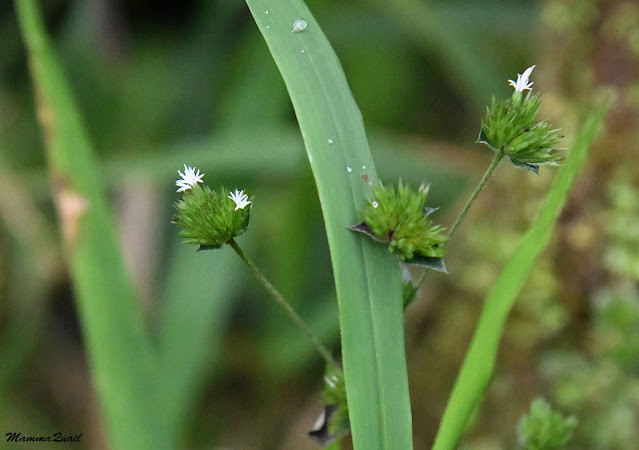 |
| Elephant's Foot, Elephantopus mollis |
My daughter was ahead of my when she heard me exclaim and she came back quickly to see what mt excitement was all about. I had found another orchid! This one, I later found out, was a native Puerto Rican orchid, and not an introduced one like the Philipinne Ground Orchid we saw earlier.
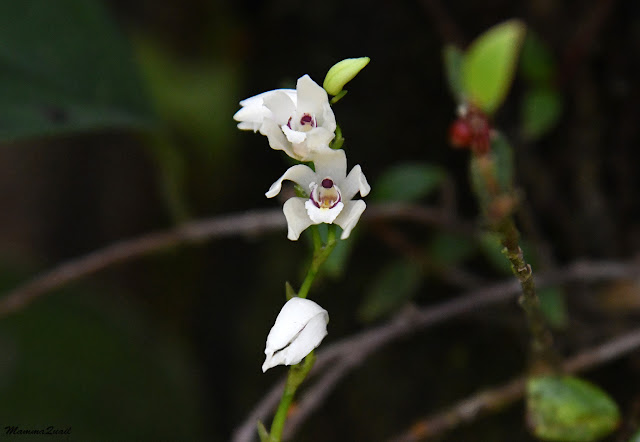 |
| Parrotbeak Orchid, Dilomilis montana |
The orchid was a wonderful find but really, almost any plant there was new to me and a reason for celebration.
 |
| Crepe Jasmine, Tabernaemontana divaricata |
So was the wildlife. My daughter pointed out to me a translucent green slug that slithered on a tree nearby. The only other brightly colored slug I knew was the banana slug of northern California. This slug was much smaller and looked like a living gem.
 |
| Puerto Rican Semi-Slug |
We saw many lizards on this hike as well, and the best photos of them were taken by my daughter. She also was better than me at spotting them, especially when they were hidden in the vegetation.
 |
| Krug's Anole, Anolis krugi |
We saw plenty of butterflies too, but they were much harder to photograph than the lizards or the slugs because they kept moving. One of the butterflies did eventually pause on the sunlit area of the trail and it was enough for my daughter to get a good photo of the pretty insect. I love how its eye matches the ringed eye spot on its wing.
 |
| Puerto Rican Calisto |
We came upon another sensitive plant and this time I took the opportunity to photograph the leaves 'before' and 'after' being touched. I resisted the urge to pet the plant all over - the leaves respond to touch only a few times before losing their ability to do so.
 |
| Sensitive Plant, Mimosa pudica |
The trail started descending and my daughter looked at me warily because she knew this wasn't a loop hike and we'd have to hike up all that we descended. I wasn't concerned - the junction was only a short distance away.
 |
| Mount Britton Spur Trail |
Bromiliads are common epiphyte plants in tropical rain forest, and the El Yunque forest had a fair share of these lovely plants, now also common as household plants. There were many bromiliads along the trail but only few of them were in bloom.
 |
| Betero's Tufted Airplant, Guzmania beteroniana |
One of the bromiliads bloomed a bit far from the trail so I recruited my daughter to take its photo with her birding tele lens.
 |
| Betero's Tufted Airplant, Guzmania beteroniana |
Another tropical beauty we saw plenty of was the Narciso Colorado. Nearly all of them were already fruiting however, and it was great to see some that were still blooming.
 |
| Narciso Colorado, Renealmia jamaicensis |
I took a closeup of one of these Narciso flowers, it was so delicate and beautiful!
 |
| Narciso Colorado, Renealmia jamaicensis |
I cannot resist posting yet another of the numerous photos of begonia flowers I took on that hike. Just he other day I was going through the floral department of a supermarket in California and could barely recognize the heavily altered cultivars of this wild beauty as its relatives.
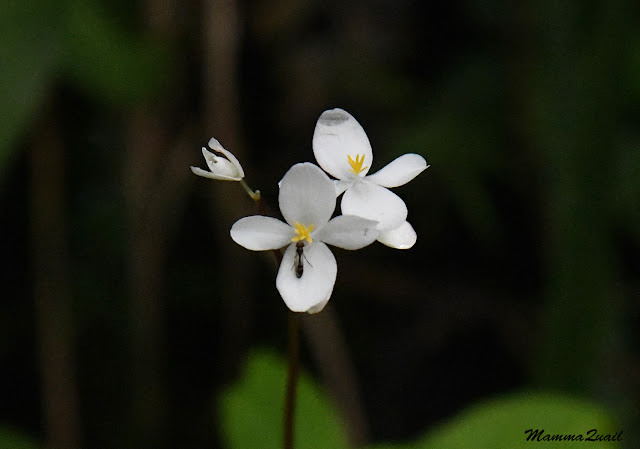 |
| Corazón de Poeta, Begonia decandra |
We reached the trail junction and found there a few hikers who were debating among themselves which way to go. I had a photo of the trail map that I took earlier at the Baño Grande information kiosk (I had forgotten the actual map that I had at the lodge). I opened the photo and showed it to the hikers. One of the trail splits was leading to the mountain's summit. We weren't going there and neither were the other hikers. The other forked downhill all the way to the Juan Diego Falls area. It would have been nice taking that one down and not have to return on the same trail we came up on, but than would necessitate hitch-hiking back up to where we had parked at the Mount Britton Trailhead. On a different occasion I might have gone for it, but I was not alone and my daughter didn't like the idea. While the other hikers talked about those same possibilities, my chika found me yet another fungus.
 |
| Fungus |
In short, we didn't take any of the trail forks but turned around and started back up the Mount Britton Spur Trail. I don't mined in and out trails much - it gives me the option of taking better photos on the way back.
 |
| Guadeloupe Wild Coffee, Notopleura parasitica |
Sometimes I see things on the way back that I had completely missed in the way in.
 |
| Grona adscendens |
I was losing track of what I had seen already. My head was spinning with all the botanical beauty surrounding me.
 |
| Creole Tea, Sauvagesia erecta |
Even my daughter, who isn't usually taken by plants was impressed by the infinity of shapes and colors all around. She even requested that I'd photograph this particular plant with its red-veined leaves.
Even plants that I know to be of very humble looks seemed fancier here.
 |
| Elegant Spikerush, Eleocharis elegans |
It started raining again. A light drizzle at first but then it became heavier. We pulled our rain ponchos out and donned them to protect our cameras.
 |
| Mount Britton Spur Trail |
The precipitation might have been heavier but when we returned to the Mount Britton Spur trailhead, the clouds were lifted enough for us to have a view all the way down to the coast.
We didn't stop again at the junction but continued down the asphalt pavement to the Britton Mountain upper trailhead.
 |
| Moth |
I didn't take as many photos now, because of the rain and because most of the sights I've photographed already on the way up. Still, some sights merited pulling briefly the camera from under its plastic cover.
 |
| Bejuco de Puerco, Ipomoea tiliacea |
The rain eased a bit, then slowed into a light drizzle again. I was photographing more now, and when we got to the Mount Britton trail again I took off my poncho and folded it into my backpack, wet as it was. My chika kept her poncho on. She didn't take any more photos on this hike.
 |
| Stiffhair Waxweed, Cuphea strigulosa |
Hibiscus is a common landscape plant in many places I've been too. While wild hibiscus is native to the Caribbean Islands, some of the cultivated varieties made it back into the wild and bred with the wild species. I saw a number if the hybrids on this hike.
 |
| Red Hibiscus, Hibiscus archeri |
The clouds parted again and for a short time the forest was again illuminated by the sun. We trotted down the trail, often having to make way to uphill going hikers. By that point I was happily clicking my camera away indiscriminately at just about anything.
 |
| Bromiliads |
When we arrived at the tody's nesting hole again we paused for a few moments to see if the little bird would show itself again. It didn't, so I settled for a nearby lizard and pulled my chika to follow my down the trail.
 |
| Anole |
There were many other hikers along the trail all throughout the hike. It was quite difficult to get a snapshot of any part of the trail in a people-free state.
 |
| Mount Britton Trail |
The rain resumed just as we were about to exit the Mount Britton Trail. I took a goodbye photo of the pinkfringe arch by the trailhead and we stepped down onto the access rod loop.
 |
| Pinkfringe, Arthrostemma ciliatum |
On the way back to our parking spot we looked for that leaf slug that my chika found earlier. We didn't find it again, but I did find many other wildflowers that I had overlooked before.
 |
| Tropical Kudzu, Neustanthus phaseoloides |
Some of these plants I had no difficulty classifying into their genus. I'd recognize a blackberry anywhere, I think.
 |
| Roseleaf Bramble, Rubus rosifolius |
Many other flowers however, remained a mystery to me until I got the chance to post them on iNaturalist and get input from the local experts.
 |
| Star of Bethlehem, Hippobroma longiflora |
Mount Britton Trail hike was wonderful. It was the best introduction to the nature of Puerto Rico that we could have asked for. It wasn't hardly enough, though. After a satisfying lunch at the visitor center we went on the nature trail there, intent on completing it this time.










Wow! Thta's an amazin place! I never thought about it before reading your pot but now I want to go there too...
ReplyDeletePuerto Rico is so lovely! And affordable too. You and Anenet would really love it there!
Delete